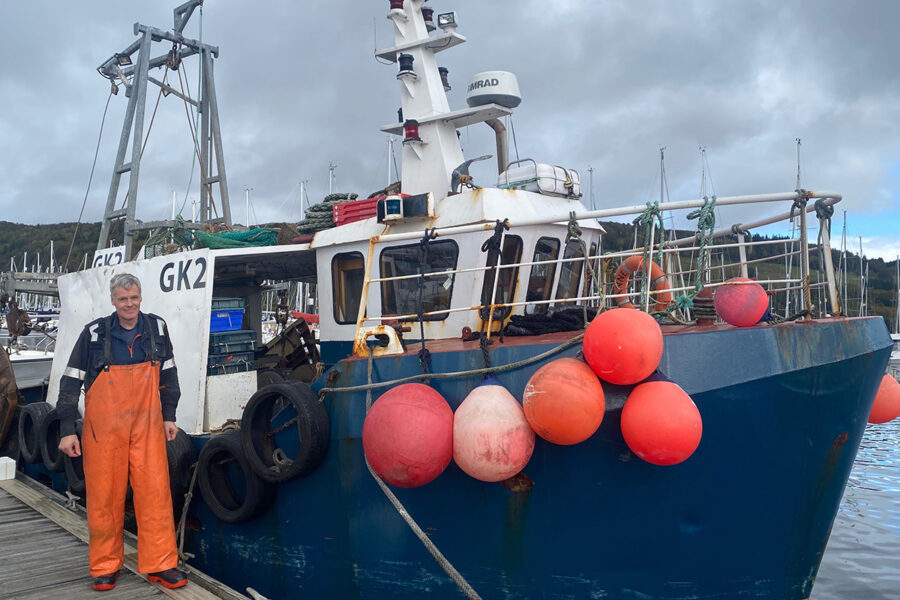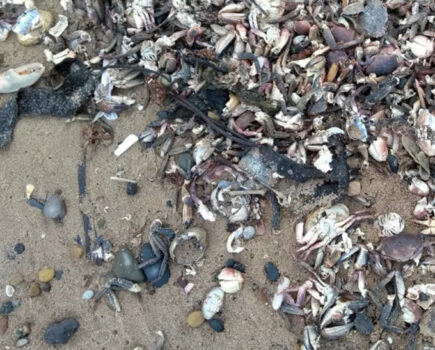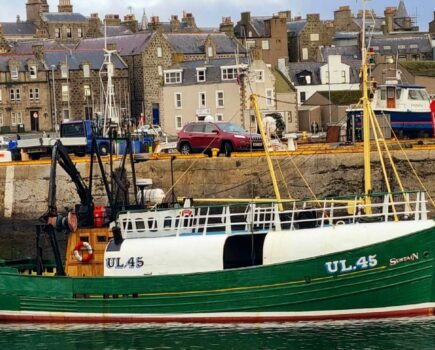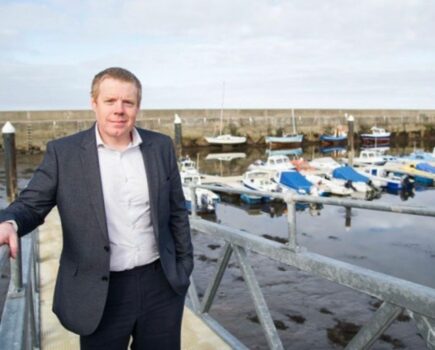Defra has confirmed the latest funding scheme to be financed from the £100m UK Seafood Fund, reports Andy Read.
Grants of up to £40,000 are now available for fishing vessel owners to trial greener engine technology – both more efficient conventional engines, and innovative solutions such as battery power.
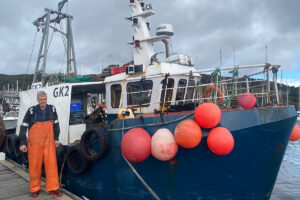
Although the Clyde has one of the oldest fleets in the UK, many of the small-scale inshore vessels operating in the region will not be eligible for funding, as the sectors they are classed in are considered to be over- capacity. Only vessels using static gear are eligible under the terms of the scheme. Ian Wightman, skipper of the prawn trawler Eilidh Anne, told Fishing News: “The majority of the boats are one breakdown away from serious issues.” (Photo: Lucinda Rouse)
Whilst there was welcome for the scheme in principle, industry concern was expressed that the combination of eligibility criteria and the need to obtain MCA approval for changes to the vessels concerned may result in little or no uptake of the grants by the industry.
Older vessel engines are some of the industry’s biggest polluters. Many owners of older vessels are fully aware of this, and of the day to day fuel cost savings that could be made if vessels were re-engined, but often lack the funds to manage this.
Recent analysis undertaken by one consultancy, MarFishEco, suggested that half the UK fleet is more than 30 years old, and that excess fuel consumption relative to state-of-the-art engines was contributing unnecessarily to the UK fleet’s overall carbon footprint, which is the equivalent of 110,000 UK homes.
Vessels in what Defra is calling the ‘small-scale coastal fleet’ – vessels under 11.99m that use static gears – can apply for up to £40,000 to trial hybrid and electric engines, and up to £20,000 to fund replacement petrol and diesel engines that are more environmentally friendly. Engines being replaced must have been built prior to 2011 to be eligible for replacement grants.
All changes to vessels under the scheme will require advance approval from the MCA.
As well as supporting this section of the fleet to deal with rising fuel costs, Defra says the trial aims to gather new data and evidence to help reduce greenhouse gas emissions, improve efficiency and reliability, and help the fishing industry on the path to net zero.
Katy Ware, director of UK Maritime Services, said: “We fully support this scheme to trial new, greener engines in the fishing industry, and will assist owners participating in the scheme to ensure that the engines are safely installed. Everyone taking part will be making a significant contribution towards achieving net zero in the fishing industry.”
The scheme is being administered by the MMO. Full details can be found here.
Mike Cohen, deputy chief executive of the NFFO, told FN: “It is very encouraging to see that this grant funding has been made available, but I fear that it may be an idea ahead of its time.
“Electric/hybrid propulsion technologies are coming, but they are in their infancy, and the regulations governing certification of these sorts of modifications are extremely restrictive. Sadly, I am sceptical about whether any significant take-up of the larger grants will be possible in the time allowed.
“It’s a shame also that the smaller grants for cleaner fossil fuel engines are only available to static-gear vessels. The mobile-gear fleet has a lot to gain from more efficient, cheaper-to-run engines. Their work is more carbon-intensive, too, so this would also be a more significant contribution to the net-zero agenda.”
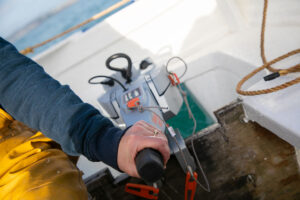
Two Brothers Fishing undertook a project in 2020/21 to establish the feasibility of powering small day-boats with electric engines. (Photo: Poppy Jakes Photography)
Fisheries scientist Magnus Johnson, who is based at the University of Hull and is at the forefront of efforts to develop alternative sources of propulsion in the UK fishing industry, expressed similar sentiments.
“The aims of the scheme are laudable,” he told FN. “I just hope that administrators will be able to tweak what has been announced to make it deliverable, and also to link this support to other funds available under the overall UK Seafood Fund.
“For example, I’m aware of one harbour looking for support to bring in suitable charging points, that would enable new electric-power boats to recharge from zero-emission electricity.
“In order for the transition of the small-scale fishing industry to electric to be in any way successful, harbours also need to start thinking in terms of having many boats requiring easy and safe access to recharging facilities.
“Similarly, the conversion from fossil fuel to hybrid or electric for under-10m vessels is quite technical, and we have a shortage of marine engineers supporting this sector, most of whom will not have worked with this technology before. Ideally, the scheme should include or help to develop an advice service for skippers to use – every boat will have different requirements.”
Fishing News has reported regularly on the various schemes being funded from the UK Seafood Fund, £65m of which is earmarked for larger infrastructure projects such as harbour redevelopment. £20m has already been awarded in Round 1 of the scheme for projects including the expansion of processing facilities for popular British fish like Scottish salmon and Cornish sardines, and the renovated dry dock at Shoreham Harbour.
‘Long-term benefits through going green’
This new funding will benefit both industry and environment, writes fisheries minister Mark Spencer
From North Sea trawlers through to seaside day boats, the UK fishing industry is built on boats of all sizes – and our small-scale fishing fleet is an important cog in our fishing fleet machine. It supports livelihoods in coastal communities, contributes towards our overall economy, and is a key part of our food security.
It lands around 36,000t and £122m-worth of fish and shellfish annually, and it is my priority to support our dynamic small-scale coastal fleet and help overcome the challenges it is facing.
Since the UK left the EU, we have roughly doubled the quota for the under-10m vessels within our fleet. Yet over half of boats across the UK fishing fleet are older models that are in great need of modernisation to ensure they are operating as efficiently as possible.
That is why I’m delighted to announce that the government has made £2m available to provide important upgrades across the small-scale fishing fleet. This new scheme will help those boats, alongside the rest of the small-scale coastal fleet, to reap the benefits of this additional quota by providing fishermen with safer and more reliable boats to operate, as well as helping them to become more environmentally sustainable.
The scheme offers fisherman the chance to bid for grants of up to £40,000 to trial hybrid and electric engines, and up to £20,000 to fund replacement petrol and diesel engines that are more environmentally friendly.
This is all part of the £100m UK Seafood Fund, which is to support innovation, skills and job creation around our coastline.
I’m well aware that fishermen have also been struggling with increasing fuel prices – caused by various factors including Putin’s war in Ukraine. By replacing older engines with newer, more fuel-efficient versions, or replacing them altogether with hybrid or electric engines, this new scheme will help support the fishing industry in dealing with these rising fuel costs, while also accelerating our mission to achieving net zero.
I’m immensely proud of the resilience and perseverance of our fishing industry. I urge fishermen in the small-scale fleet up and down the country to head here to apply for this funding, which seeks to offer them long-term benefits through upgrading boats and helping them to go green.
This story was taken from the latest issue of Fishing News. For more up-to-date and in-depth reports on the UK and Irish commercial fishing sector, subscribe to Fishing News here or buy the latest single issue for just £3.30 here.

